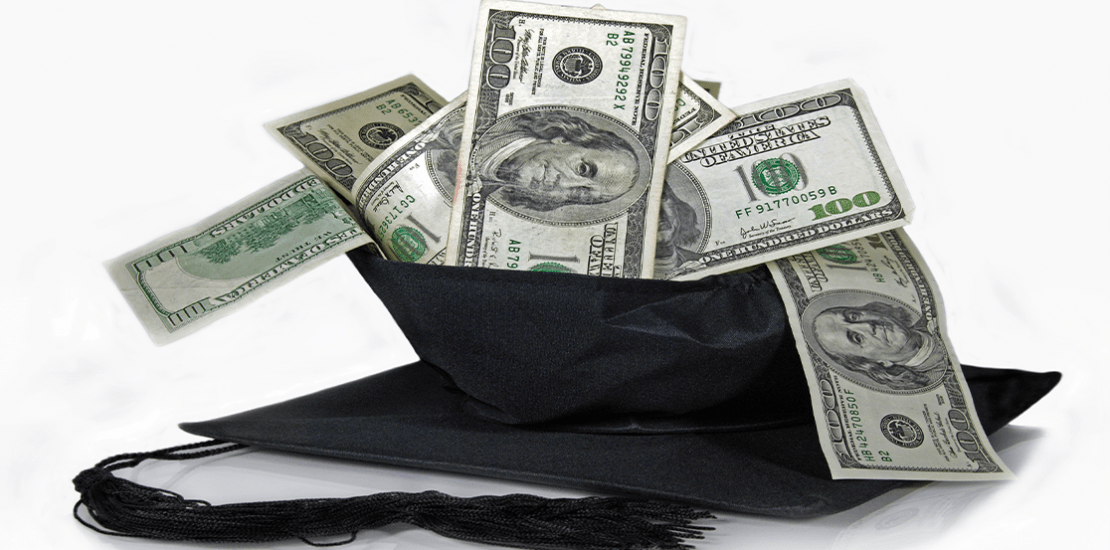- August 5, 2020
- Posted by: Carter Davis
- Category: News

You may be pinching pennies during the crisis of COVID-19, and federal student loan payments might not be one of your primary concerns right now. That’s okay! Graduates everywhere in every stage of life are frantic as their jobs shut down and money becomes even more of a precious resource. Luckily, on March 27th, the government enacted the CARES Act to ease some of the burden of finance from your shoulders. While you are self-isolating, take a look at how the CARES Act impacts your student loans and what you can do while CARES is in place.
What is the CARES Act?
When the country started shutting down, borrowers became aware that it is much harder to pay off loans when you cannot work. In response to this crisis, the CARES Act was created and passed. As a means to give borrowers temporary federal student loan relief, any payments on federal loans scheduled between March 13th, 2020 and September 30th, 2020 are in administrative forbearance. While in administrative forbearance, you do not have to pay any money towards your federal loans, and they will not accrue interest.
Keep in mind that the CARES Act does not yet include private loans or loans provided by your school. Make sure to check on the Federal Student Loans website to ensure you are currently covered by the CARES Act. Different states may have different protections in place to keep what money you have in your wallet instead of paying a debtor, so make sure to check on your state government’s website to look for these measures.
How Does the CARES Act Affect You?
Every borrower’s repayment situation is going to be different. Especially during the COVID-19 outbreak, even the fact of your employment might be up in the air. If you were laid off or furloughed, your income-driven repayment plan would normally change. Make sure to edit your income information accordingly before you need to start making payments again so that you have payments you can afford. Because you do not need to make payments right now, changing your income might be something you would forget about—but that doesn’t mean it’s not important.
If you were set to be recertified for your income-driven repayment plan within the period affected by the CARES Act, your recertification has been moved ahead 6 months and you will be notified accordingly.
Even if your job was unaffected by COVID-19 because you are an essential worker or working from home, the CARES Act will still influence your life. Stay proactive and check on updates involving your federal loan repayments.
How Will the CARES Act Affect Your Loan?
During normal circumstances when you are not paying anything off due to income-driven repayment plans, lack of payment could affect how much you owe by accruing interest. However, during these abnormal times combined with how the CARES Act impacts your student loans, you will not accrue any interest. This means that you will not be punished for having $0 payments. Any interest that was already on your loan before March 13th, 2020 will remain, but none will be added on until after September 30th, 2020. Even if you do not make any payments, it will not affect your total repayment amount.
Not only will interest not be accrued on $0 payments, but those “payments” will count towards your income-driven plan’s loan forgiveness year amount. If your plan requires consecutive monthly payments to qualify for loan forgiveness, don’t worry during these seven months, as this time will still count as if you are making regular monthly payments.
Paying Your Loan Off During CARES
If you would still like to make payments on your loan or loans that are under administrative forbearance, good news! Because you will not accrue interest every month, it will be easier to get a larger chunk of your loans paid for. Your monthly federal loan payments will still be $0; however, you can choose to put money towards your loan anyway. You will have to contact your loan servicer to pay back any amounts you want to tackle during the CARES Act. These payments will not be automatic and will be on your own terms.
If you do not want the administrative forbearance and wish to resume monthly payments before September 30th, 2020, contact your loan service to opt-out. This is different than making payments while under the administrative forbearance! If you opt-out of the administrative forbearance, your monthly payments will be resumed, and you will receive bills.
Loans That Started During the CARES Act
Graduates that were slated to begin paying back their federal loans between March 13th, 2020 and September 30th, 2020 are also covered by the CARES Act. Your federal loans will be under administrative forbearance for as long as you were supposed to be making payments and your interest will not capitalize—just like older loans. These months will be considered being paid towards debt forgiveness plans and you will resume paying after September 30th.
Loans Not Covered by CARES
The CARES Act only covers federal loans. If you have a private or commercially-granted loan, you will not qualify for the help contributed by the government from the CARES Act. Similarly to how they are handling debts with financial loans, some states have regulations put in place for private and commercial loans. Such protections and regulations should be on your state’s (or in some cases, city’s) website and can offer vast financial help during these uncertain months.
If you need help understanding your federal loans or assistance with loans not covered by the CARES Act, you can get help from a company like Hope Credit. Your loans might be able to be refinanced for lower monthly payments, especially while our country is stricken by COVID-19. Don’t let private companies strike you down with more debt and payments that you can’t handle.
Stay Informed About Your Loans
As with news on almost any topic during the Coronavirus outbreak, keep yourself updated in case further government action is taken in the fight against student loans. For now, however, assume that you will resume making student loan payments after September 30th, 2020. These are turbulent times, and anything can happen between now and September. Watch the news or keep tabs on trustworthy news sources to figure out how to best progress with your loan repayments in the future.

